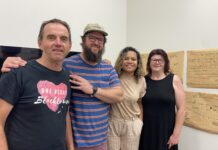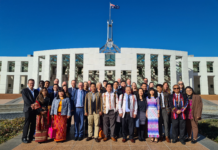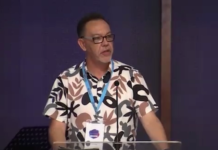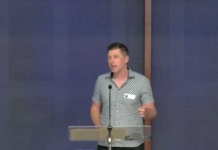
Ecclesiastes 12:12, in asserting the primacy of godly wisdom (12:11), makes this apparently disparaging observation about books and study:
“Be warned, my son, of anything in addition to them {“the words of the wise”}. Of making many books there is no end, and much study wearies the body.”
I don’t think it really is denouncing books and study per se. Rather, the text warns the young hearer that study and the writing of books are not ends in themselves. They are for the purpose of growth, life and truth, ultimately found in “the one Shepherd” {verse 11} and explained in the words of the wise. We are not to “grow addicted to research itself, in love with our hard questions …” as Derek Kidner, puts it in A Time to Mourn and Time to Dance” (106).
No, I want to affirm the importance of books, and hence reading, for disciples of Jesus. And by “reading” in this context I mean a particular sort of reading. I mean the appropriately careful, thoughtful, and reflective engagement with a text, engagement that results in personal enjoyment, plus learning and resulting in transformation. This kind of reading is not the skimming of a magazine article, or the fleeting dipping into a twitter feed. It is a little more than that.
Not that there is anything wrong with those activities in themselves. Yet if skimming and dipping is all the ‘reading’ in which we engage we will be short-changing ourselves, our discipleship, and our world … especially if we are responsible for leadership in our churches in some form or other. For, in the end, the kind of “reading” I am talking about emerges from posture of discipleship, curiosity and love of learning. For a “disciple” is a “learner”, for the purposes of transformation. This kind of transformational reading is beyond the cursory thumbing of a doctor’s surgery magazine, or the skimming of a cheap, time-filling novel while in transit. Transformational reading may be accompanied by pleasure and entertainment, but it is beyond merely reading for filling in time.
Now, of course, I am not limiting “reading” to the physical action of looking at something written, whether it is on a piece of paper or in digital format. Some of us are visual learners. “Reading” a written page is a pleasure for those. But for others of us, “reading” in that medium is difficult, a barrier to actual engagement in the learning process. So I want to include under the title “reading” other media: audio books and podcasts.
However, I exclude watching video of a talk as “reading”. For reading is a different activity. It is particularly focussed upon words alone, the bearers of ideas and emotions, exclusive of (sometimes distracting) visual accompaniments. It means we can visit and re-visit, mull over, meditate upon, think about, and argue with, the ideas and information being presented. I want to affirm and encourage that kind of reading.
In part, my motivation in writing about this springs from a niggling concern emerging at the margins of my thinking: that the discipline of this kind of “reading”, for many Christians, has slipped over the last twenty years or so. Now this is perhaps symptomatic of a trend in wider culture. We are grabbed by the brief sound bit. Our attention flit fitfully over 140 character tweets. We dip into blog snatches. We scroll cursorily across multiple digital pages of data. We drown in data. We are information rich, but wisdom poor. As a result, the willingness (and even capacity) of people to engage with sustained pieces of written argument and think things through is (perhaps) a somewhat diminished.
We followers of Jesus are not inoculated against such trends. Consequently, our capacity to thoughtfully engage others with the gospel, and clearly present Christian belief in common words is diminished also, I believe.
So, my question is, are we “reading” sufficiently in the sense outlined above? Are we feeding regularly on fruitful reading, or merely snacking on material that may entertain but not also transform? To my ears this sounds a little pretentious, overly serious, intense and perhaps with an air of superiority. Nonetheless, I believe it is an important form of reading that we neglect to our peril.
So allow me to encourage “reading” in the sense outlined above. Further, let me suggest six adverbs that give form to the function of this kind of reading.
First, we need to read voraciously. What do I mean by that? I mean that in some way we “devour” what we read. We take it in. We absorb something in it that in small or greater ways changes us.
Second, I think we need to read eclectically. That is, let’s not get stuck just in one narrow subject area of interest. For those of us who are pastors, this means that we should not limit our reading to “professional’ reading, or reading only those things that we agree with. Dip into different subjects and themes, both within your area and outside of it.
Third, and this is related to the word above, let’s read broadly. By this I mean, let’s read across different genres of writing: fiction and non-fiction; prose and poetry; essay and novel; academic and popular. And let’s read across different cultures. The West does not have a monopoly on great writing. Let’s read writers from across the ages. Wisdom does not reside only in the past. Yet neither is it limited to the recent best-seller.
Fourth, let’s read consistently. The intellectual, spiritual and emotional nourishment that derives from reading is best not approached on a feast or famine basis. Consistent, daily intakes provide the best sustenance. Personally, I am rarely without something that I am currently reading (unless it is a deliberate ‘fast’ from reading). Always having something to read (book or e-reader or digital device) with us means that we always have something useful to do with that unexpected, or deliciously-expected vacant time, if we are looking to fill it. This also means we will always have something fresh to sustain ourselves, and suggest to others.
Read discerningly is the fifth adverb I would suggest. Just as we need to discern the accuracy, utility, and truth of what is placed on the internet, or we will be duped and distracted, so too we need to discern what we are reading. Not all that is written is either useful, accurate, interesting, or beneficial (that is, productive of the good). So let’s choose our books wisely, and read with discernment
Sixth, can we benefit by reading reflectively. This will happen more with some books than others. But all books we choose to read can enrich us in some way. They can do this as we think about their ideas, wrestle with their arguments, are moved by their evocative descriptions, are challenged by new truths they reveal or ponder on mysteries they portray.
So … what are you reading?
Here are a few suggestions from what I have “devoured”, or am “feasting on”, over the last few months.
A couple of novels: one by modern Indian writer Aravind Adiga, The White Tiger; the other a 1900’s “classic” by W. Somerset Maugham, Of Human Bondage.
If you are interested in leadership, here are two gems from a systems theory perspective: Roberta Gildbert’s, Extraordinary Leadership, or The Leader’s Journey, by Jim Herrington, Robert Creech and Trisha Taylor.
What about immersing yourself in some of the many serious, academic or semi-popular works penned by Morling College lecturers? Here’s two to start with: Global Church, by Dr. Graham Hill, and Tamar’s Tears, from Dr. Andrew Sloane. One explodes what we must learn from the rapidly transforming church across our world; the other helps us, from an evangelical perspective, to grapple with feminist readings of Old Testament passages.
Worth reading is Miroslav Volf’s Allah, a serious theological wrestling which will challenge your thinking about how as followers of Jesus we are to think about the God of Muslims and interacting with them. Or what about tackling N. T Wright’s, The Resurrection of the Son of God, if we are serious about our belief in the resurrection of Jesus?
Or, dip into Shakespeare’s Sonnets, and then listen to versions of some of them put to music by Australian song-writer, Paul Kelly, in Seven Sonnets and a Song. Rich stuff!!
Let’s really “read” books for the glory of the One who inspired the Book of scripture (2 Tim 3:16); in the name of the One who came as the Word (John 1:1); and by the power of the One who gives us the “message of wisdom … and the message of knowledge” (1 Corinthians 12:8). By doing so we will be nourished and nourishers of others.





































